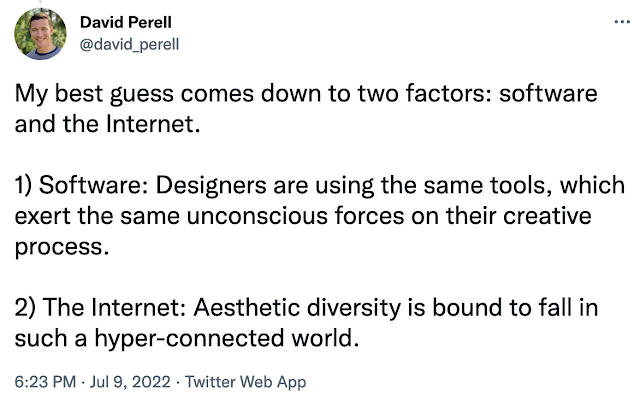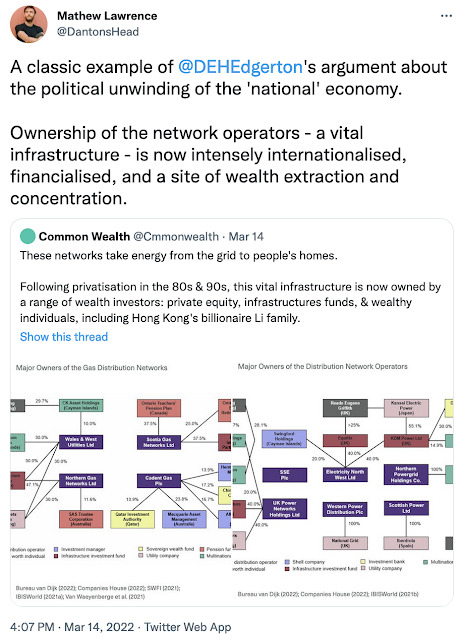Older notes: translucence and webs and governance
Clearing out old tabs...
Another amazingly thoughtful and insightful article from Rachel Coldicutt:
Conley’s framing seems revelatory because care work is often characterised as a bundle of physical acts and emotional feelings, but in reality it involves predicting eventualities, mitigating the mitigatable, and softening the blows of the unavoidable.
Care work is the anticipation of grief is a beautiful articulation of care as a thoughtful and a thinking practice; a constant loop of recognising and managing risk. Taking care involves noticing and remembering, writing lists and prioritising; doing the right things in the right order to get to the best outcomes in the circumstance.
When I remind my son to put a jumper in his school bag on a sunny day, it’s because I’ve looked at the weather forecast and know it will be colder later. Likewise, when we reply to a government consultation, it’s because we’ve looked at the proposals and know the outcomes will be unjust or unworkable. Both things occur in the hope of offering some protection against the future.
Not having to worry about taking care — not living in a constantly anticipatory space — is a privilege. It might mean that someone else cares for you, or that consequences cannot harm you. Perhaps you’re young and fearless, or older with established power.
The Green Web Foundation put out a new report -
In 2021 digital sustainability became a fast-growing field with an uptick in interest and commitments from the public sector, the private sector and civil society.
We are now in a period after many public commitments have been made and where it is unclear how to move from those high expectations to meaningful policy and action. We call this the fog of enactment in digital sustainability. In this fog, different groups will use the situational ambiguity to shape markets or policy landscapes to their advantage. We need ways to navigate this fog and ensure climate action is meaningful and impactful.
There are 3 calls to action - better environmental impact modelling (so that harm isn't simply transferred from, say, energy to water), critical assessment of industry sustainability claims, and tackling the ways the tech industry enables the fossil fuel industry. "A single contract from a tech company to accelerate fossil fuels extraction can result in carbon emissions that are many times the operational emissions of the company itself."
Many good bits in Dan Brooks's [FT, paywall?] article on morals and ethics.
"What’s changed is that a whole generation of college-educated people has learnt how to frame basically anything in moral terms, whether it’s their Cheetos marketing strategy or migrant labour or their date not responding to text messages."
I was delighted to encounter the Cambridge Resilience Web - which, like so many things here, has two flavours, one for the city (more interesting) and one for the University.
Whilst Martin Weller's angst-post is ostensibly about edtech, a lot of it feels like it applies to other whatever-techs that have been around for a couple of decades or more.
Why is everything the same now? Why do so many logos have the same, bland sans serif designs? Well -
 |
| https://twitter.com/david_perell/status/1545819896004624384 |
RadicalxChange wrote up their recent evolution, with a focus on plurality, which I found interesting. I wish I had more bandwidth to keep up with the Discord, but the occasional newsletter is more my level at present.
Nathan Schneider is perceptive as ever, in his draft paper Web3 Is the Opportunity We Have Had All Along:
The most salient opportunity that crypto presents, more than any particular
technical feature or affordance, arises from the amnesia of innovation: that
deer-in-the-headlights effect as a new technological paradigm shines brightly
enough that people freeze and forget to apply once-stable, and still applicable,
social contracts to it. Much as gig platforms made regulators forget labor
laws (Cherry 2015–2016) and cloud services did not face the same privacy
rules governing older telecoms (Zuboff 2019), the strange new tech of crypto
has made space for breaking and remaking norms about how networked
assets are to be owned and governed. What once seemed (but did not have
to be) fixed is now (by no particular necessity) in flux.
... Once again, under the cover of decentralization-talk, the centralization power
grab is well underway. Venture capitalists have recognized that crypto
protocols represent an even greater chance for value capture than platforms
did in Web1 or Web2 (Wilson 2016). Platforms operate within rules; protocols
write the rules (Galloway 2006). A further advantage for the power grabbers
lies in the amnesia: crypto’s ability to operate ambiguously with respect to
territorial law and regulation, carrying out forms of ownership, governance,
and financial chicanery that could not be gotten away with using more
familiar technologies.
Dave Birch writes about the metaverse:
These virtual worlds and experiences have been around for many years and financial services organisation have been experimenting with them for a generation (remember those virtual bank branches in Second Life). Therefore it is reasonable to wonder what it is that will transform these virtual worlds into a metaverse? It is not simply VR headsets or AR spectacles. I could use them to play World of Warcraft and it would be a lot of fun, but it would still be nothing more than a virtual world. A metaverse is more than Second Light UHD.
The Financial Times defined the metaverse as a collection of shared virtual worlds which are interoperable in the sense that people can navigate them while taking with them their digital identity and their digital assets.
Dave goes on to say:
We already have the tools and techniques needed to do implement digital identities that work in this context. We have private keys and digital signatures and computers and all of the other components. We already have smartphones that contain Trusted Execution Environments (TEEs) capable of handling advanced cryptography yet we send them completely insecure text messages and call them "security".
- Ha.
Thoughts about generative interoperability from Ian Brown and what that means for online civic/public spaces.
 |
| https://twitter.com/as_bello/status/1504634059556892686 |
Thanks to Cassie Robinson for a reminder of José Ramos's super proposal for "cosmo-localism" which "describes the dynamic potentials of our emerging globally distributed knowledge and design commons in conjunction with the emerging (high and low tech) capacity for localized production of value." Lots of good thinking (and examples of current practice) relating to manufacturing, IP, ownership and collaboration. It's always good to come back to ideas like this after a while to see how your reading of them has developed, and what has changed in the world.
I enjoyed Near Future Laboratory's General Seminar on 'solarpunk' in its podcast summary form. A fascinating wander through the politics of solarpunk, the importance of seasonality and aligning activities, and also where solarpunk might work - or not. The seasonality stuff is especially resonant for me - whilst I can see organisations working differently acround the year, in my last role at the OPEN I had close colleagues in the other hemisphere, so and any seasonal energies we might have were 6 months out of alignment. Tricky. The Seminar also talked about ideas that work differently in different times and places, such as allotments across Eastern Europe vs the UK after the Second World War. (I've been thinking about allotments a lot recently as CoFarm thinks about how to set up more community farms. It feels like a much better use of community land than individual allotments and able to involve many more people in a more resilient system.) Overall I was left with the sense of the importance of alternative visions of the future - not the (unlikely seeming) personal flying cars, or the corporate automated luxury capitalism (for the few, anyway), but something else. And that these visions need to appear in our world at all levels - from children's picture books to local government planning and academia.
Alex Steffen says the future is 'translucent' - harder to predict:
The strategic environment is increasingly translucent. It lets through enough light for us to know the direction we’re heading, but keeps the road ahead too dim to know what’s ahead.
... The rising tempo of change, and the imminent revelation of the magnitude of change to a much wider group of people mean together that everything is changing, all at once. This simultaneity of shifts in interconnected systems is a profound challenge to our ability to predict what’s coming. The models excurse their boundaries. The data become contextually unreliable. The odds go wonky in combinatorial explosions.
... We work with the tools we have. In the case of climate-informed strategy, many of these tools don’t work very well. We have to work with tools that were designed to produce outcomes under very different assumptions In particular, we have a sort of intellectual technical debt around how we imagine, plan for and create solutions to address climate and sustainability issues.. Thinking in new ways demands compensating for triangulation, outdated worldviews, predatory delay and garden-variety incompetence. It also, though, demands routing around older ideas about what the problem is and how to solve it that may have made sense in their moment, but stand in the way of clear thinking now.
 |
| https://twitter.com/DantonsHead/status/1503402327994155015 |
The Covid-19 Committee has published its report and identifies a need for long term resilience and wellbeing, including the idea of the Wellbeing State. Thanks to Martha Lane-Fox for the link.
Alastair Parvin has some ideas for how the UK's planning system for residential areas could be changed.
Vaclav Smil writes that cement, steel, plastics, and ammonia are all critical to how we live today, and currently heavily connected to fossil fuel systems.
A long thread summarising a paper by Sophus zu Ermgassen et al, about UK housebuilding, sustainability and how finance policy changes might affect this.
Via Nathan Schneider, a multistakeholder co-op identity provider - v interesting! https://www.hello.coop/
Intrigued to see Dynamic Land - whilst the interfaces didn't strike me as hugely radical, having seen some pretty wild things at AT&T Labs and elsewhere years ago - the community embedding and nonprofit status are interesting. I wonder if it will last the 50 years it plans to, or whether a model which scales to other communities will be possible. I can't pick out excerpts that capture it - there's a lot of information on the webpage. HT Matt Webb.
Maybe we shouldn't assume, legally, that computers are operating correctly - see Bentham's Gaze's briefing note.
 |
| https://twitter.com/indy_johar/status/1504065016470900737 |